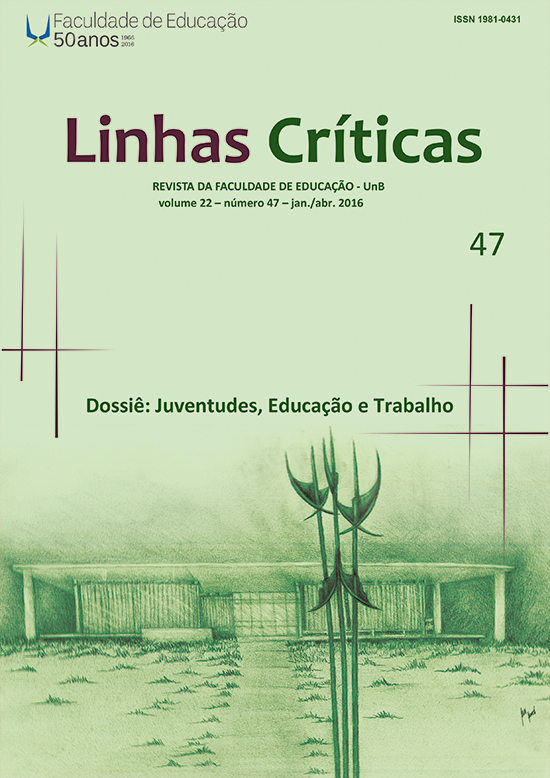Favela's young cultural producers
DOI:
https://doi.org/10.26512/lc.v22i47.4766Keywords:
Youth, Entrepreneurship, Slums, Art and cultureAbstract
In this paper, I analyze the material collected as part of an ethnographic research that I develop since 2010 in Rio de Janeiro, in the context of which I’ve made some thematic interviews with young cultural producers who are slum’s dwellers. Listening to their testimonies, watching their practice, I seek to understand the specificity of these activities, the qualities required to exercise them and the obstacles faced. I set my questions in the context of the centrality assumed by the field of culture as a resource, as part of the operations of urban re-qualification and in the context of the transformations that have occurred in labor market. The slums (favelas), historically considered territories of poverty and violence, are now celebrated as territories of opportunity.
Downloads
References
ALBERTI, V. Manual de História Oral. Rio de Janeiro: Ed. FGV, 2005.
ARANTES, O. Uma estratégia fatal: a cultura nas novas gestões urbanas. In: ARANTES O.; VAINER, C.; MARICATO, E. (Orgs.). A cidade do pensamento único: desmanchando consensos. Petrópolis: Vozes, 2000.
BOLTANSKI, L.; CHIAPELLO, E. O novo espírito do capitalismo. São Paulo: Martins Fontes, 2009.
BRANT, L. Políticas culturais. Barueri: Manole, 2003.
DELGADO, M. La artistización de las políticas urbanas: el lugar de la cultura en las dinamicas de reapropriación capitalista de la ciudad. Scripta Nova: Revista Eletrónica de Geografía y Ciencias Sociales, n. 12, p. 270, 2008.
EHRENBERG, A. O culto da performance: da aventura empreendedora à depressão nervosa. Aparecida: Idéias e Letras, 2010.
EWALD, F. L'Etat Providence. Paris: B. Gasset, 1986.
GEM ”“ GLOBAL ENTREPRENEURSHIP MONITOR. Empreendedorismo no Brasil: relatório executivo. Curitiba: Sebrae, 2013.
GILROY, P. Entre campos: nações, culturas e fascínio da raça. São Paulo: Annablume, 2007.
IBGE ”“ INSTITUTO BRASILEIRO DE GEOGRAFIA E ESTATÃSTICA. Estatística de empreendedorismo: 2011. Rio de Janeiro: IBGE, 2012. (Estudos e Pesquisa, n. 22).
NERI, M. A nova classe média. São Paulo: Saraiva, 2011.
POCHMANN, M. Nova classe média? O trabalho na base da pirâmide social brasileira. São Paulo: Boitempo, 2012.
RIO DE JANEIRO. Secretaria Municipal de Cultura do Rio De Janeiro. Prêmio de Ações Locais ”“ Edição Rio 450. Rio de Janeiro: Secretaria Municipal de Cultura do Rio de Janeiro, 2014. (Edital de Seleção, n. 4).
ROSE, N. Inventando nossos selfs: psicologia, poder e subjetividade. Petrópolis: Vozes, 2011.
SEBRAE ”“ SERVIÇO BRASILEIRO DE APOIO ÀS MICRO E PEQUENAS EMPRESAS. Aprender a empreender. Brasília: Sebrae; Fundação Roberto Marinho, 2002.
______. Economia criativa do Rio de Janeiro e as MPE. Brasília: Sebrae, 2012.
SILVA, L. A. M. Da informalidade à empregabilidade (reorganização a dominação no mundo do trabalho). Cadernos CRH, Salvador, v. 15, n. 37, p. 81-109, 2002.
SINGER, A. Os sentidos do lulismo: reforma gradual e pacto conservador. São Paulo: Cia das Letras, 2012.
SOTO, H. O misterio do capital. Rio de Janeiro: Record, 2001.
SOUZA, J. Os batalhadores brasileiros: nova classe média ou nova classe trabalhadora? Belo Horizonte: Ed. UFMG, 2010.
TOMMASI, L. Nem bandidos nem trabalhadores baratos: trajetórias de jovens da periferia de Natal. Dilemas: Revista de Estudos de Conflito e Controle Social, v. 5, n. 1, p. 101-129, 2012.
______. Tubarões e peixinhos: histórias de jovens protagonistas. Revista Educação e Pesquisa, São Paulo, v. 40, n. 2, p. 533-548, 2014.
______. Jovens militantes: engajamento, implicação e desencanto. In: SILVA, G.; CORSINI, L. (Orgs.). Democracia x regimes de pacificação. São Paulo: Annablume, 2015.
TOMMASI, L.; NOGUEIRA, M.; CORROCHANO, M. C. Almanaque da Juventude e o Mundo do Trabalho. Recife: FES, 2007.
VELAZCO, D. O discurso da “cidade integrada” no Rio de Janeiro e suas implicações no cotidiano de jovens moradores da Cidade de Deus. 2014. Monografia (Graduação em Ciências Sociais) ”“ Universidade Federal Fluminense, Niterói, 2014.
YÚDICE, G. A conveniência da cultura: uso da cultura na era global. Belo Horizonte: Ed. UFMG, 2006.
Downloads
Published
How to Cite
Issue
Section
License
Copyright (c) 2016 Linhas Críticas

This work is licensed under a Creative Commons Attribution 4.0 International License.
Authors who publish in this journal agree to the following terms:
-Authors maintains the copyright and grants the journal the right of first publication, the work being simultaneously licensed under the Creative Commons Attribution License which allows the sharing of the work with recognition of the authorship of the work and initial publication in this journal.
- Authors are authorized to enter into additional contracts separately, for non-exclusive distribution of the version of the work published in this journal (eg publish in institutional repository or as a book chapter), with acknowledgment of authorship and initial publication in this journal.
-Authorers are allowed and encouraged to publish and distribute their work online (eg in institutional repositories or on their personal page) at any point before or during the editorial process, as this can generate productive changes as well as increase the impact and the citation of published work (See The Effect of Free Access).



